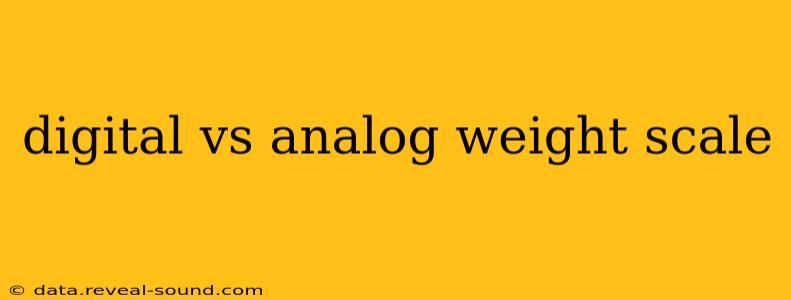Choosing between a digital and an analog weight scale might seem simple, but understanding the nuances of each type is crucial for making the best decision. Both serve the same basic purpose – to measure weight – but they achieve this through different methods, offering distinct advantages and disadvantages. This comprehensive guide will explore the key differences between digital and analog weight scales, helping you determine which is the perfect fit for your needs.
What is a Digital Weight Scale?
Digital weight scales utilize internal sensors and a microprocessor to convert the weight into a digital readout displayed on an LCD screen or LED display. These scales typically offer greater precision and accuracy than their analog counterparts, often displaying weight to the nearest tenth or even hundredth of a pound or kilogram. Many digital scales offer additional features like multiple units of measurement (pounds, kilograms, ounces, etc.), tare functions (subtracting the weight of a container), and even body fat percentage calculation (in the case of body composition scales).
What is an Analog Weight Scale?
Analog weight scales use a mechanical system of weights and levers to measure weight. A pointer on a dial indicates the weight based on the position of the weights. These scales are typically simpler and more robust, often requiring less maintenance and less susceptible to damage from power surges or battery failure. However, their accuracy is generally lower than digital scales, and readings might be subject to more error based on the user's interpretation of the dial.
What are the Pros and Cons of Each?
Let's break down the advantages and disadvantages of each type of scale to help you choose the best option:
Digital Weight Scale: Pros & Cons
Pros:
- High Accuracy & Precision: Digital scales provide more precise measurements.
- Multiple Units: Easily switch between pounds, kilograms, ounces, and more.
- Additional Features: Many offer tare functions, memory, and other convenient features.
- Easy-to-Read Display: Digital displays are generally clearer and easier to read than analog dials.
Cons:
- Battery Dependence: Requires batteries, which can be inconvenient and add to the overall cost.
- Sensitivity to Damage: Can be affected by drops or shocks.
- Higher Initial Cost: Digital scales usually have a higher purchase price.
- Potential for Calibration Issues: Over time, calibration might drift, requiring recalibration.
Analog Weight Scale: Pros & Cons
Pros:
- No Batteries Needed: Completely mechanical, eliminating battery worries.
- Durable & Robust: Generally more resistant to damage from drops or impacts.
- Lower Initial Cost: Typically less expensive to purchase.
- Simple & Easy to Use: Requires minimal understanding and operation.
Cons:
- Lower Accuracy: Measurements are less precise compared to digital scales.
- Limited Features: Generally lacks additional features found in digital scales.
- Difficult to Read: The dial can be challenging to interpret accurately, especially for those with vision impairment.
- Potential for Mechanical Issues: Moving parts can wear out over time.
Which Type of Scale is More Accurate?
Digital scales are generally more accurate than analog scales. The precise measurement technology employed in digital scales makes them superior when accuracy is paramount. However, the level of accuracy needed varies depending on the application. For casual use, the accuracy of an analog scale may be sufficient.
How Often Should I Calibrate My Weight Scale?
Calibration frequency depends on the scale type and usage. Digital scales often benefit from periodic calibration (check the manufacturer's instructions), while analog scales typically don't require formal calibration but may need occasional adjustment if the accuracy seems off.
Are There Different Types of Digital and Analog Scales?
Yes, both digital and analog scales come in various types depending on their intended use. For instance, you'll find bathroom scales, kitchen scales, postal scales, and even industrial scales in both digital and analog versions. The choice depends on the specific application and desired level of accuracy.
Conclusion
The best weight scale for you depends on your priorities and how you plan to use it. If accuracy and additional features are essential, a digital scale is the better choice. However, if simplicity, durability, and low cost are more important, an analog scale might be a better fit. Carefully consider the pros and cons of each type before making a decision.
